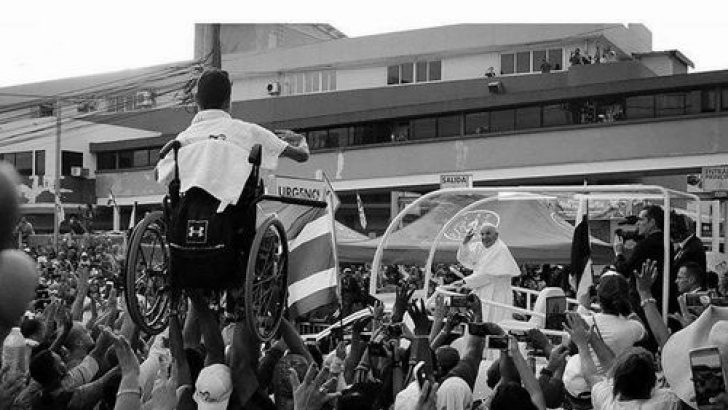The Notebook
Fr Conor McDonough
World Youth Day, the massive, global gathering of young Catholics, took place in Panama this year, finishing with a papal Mass last Sunday. As always, this colourful gathering yielded all kinds of beautiful moments and images, but the one that spoke most powerfully to me was taken by a pilgrim by the name of Carlos Yap.
This image has already yielded many beautiful interpretations, but for me it illustrates beautifully the particular role of the laity in the Church.
Think about it: World Youth Day has a massive official structure, with volunteers, major events, rules, and systems. But what happens when the unexpected arises? What happens when one of your group is in a wheelchair, and is several rows back from the Pope as he passes. Do you throw your hands up and complain about the situation? Do you grumble about the inadequacies of the system and its planners? Or do you make use of your talents to overcome, as best you can, the obstacles you face? This is what the Panamanian youth group in the picture above did, spontaneously lifting their friend Lucas high above their heads so that he could see the Pope, and the Pope see him.
It’s the same story in the life of the Church. The central role of the clergy is to teach the unchanging Gospel and to confer the unchanging sacraments of grace. But how do these spiritual realities take form and flesh today, in the home, on the street, at school or at work? That depends entirely on the spontaneity and creativity of laypeople.
We sometimes imagine that the valuing the lay vocation means getting more laypeople into the sanctuary, but that’s far from the central challenge. The church building is not just a place of gathering, it’s above all a place from which life-giving waters flow to a thirsty world. The laity are those waters, sent out from Mass every Sunday with minds and hearts renewed, responsible for their personal missions.
That personal responsibility for mission in the world has often, especially in Ireland, been undermined by clerical overreaching, but I see more and more signs that the Irish laity are growing in responsibility for mission.
Communities of Faith
In recent months I’ve come across parents who are taking it upon themselves to form communities of Faith for the sake of their children (the Living Family conference in Sligo, ‘Couples’ Time Out’ in Leopardstown, various homeschooling networks, the Nazareth Community in Loughlinstown, Cana Ireland, and so on). They see clearly the challenges facing Christian families today, but rather than wasting time complaining, these parents support each other in groups of prayer and fellowship, and are working hard to provide the kind of education their children need.
I’ve also come across young adults who have, by various routes, come to discover the joy of the Gospel after spending many barren years in nominally Catholic schools. Rather than waste time groaning about all the things they missed out on, these young adults are doing what’s necessary: they’re forming little study groups, reading Scripture together, and making use of online resources to form themselves (among others, I’m thinking of Juventutem in Cork, Spiritual Batteries in Merrion Road, and the Sanctum group on Bachelor’s Walk).
The results of these creative, spontaneous experiments are still fragile, but when viewed close-up they are quite extraordinary. The Lord is at work in Ireland, and he is raising up some courageous and creative co-workers. I can’t wait to see what they will do.
***
When we do speak in the Church about the lay vocation, it’s often in terms of charitable work and political action, which are, of course, vital aspects of the work of the laity. But we rarely speak about the intellectual life: reflection, discussion, wide reading, writing, debate. Yet some of the most influential Christians of the last century were effective precisely because of their sharp minds: G.K Chesterton, C.S. Lewis, Flannery O’Connor, Jacques and Raïssa Maritain.
In St Saviour’s Priory here on Dominick St (now conveniently located on the Green Luas Line), we’ll be discussing these issues next Thursday (February 7) at 7.30pm, as the great Fr Thomas Joseph White OP addresses us on ‘The Need for Catholic Intellectuals Today’. All are welcome!


 The pope in Panama.
Photo: Carlos Yap
The pope in Panama.
Photo: Carlos Yap 